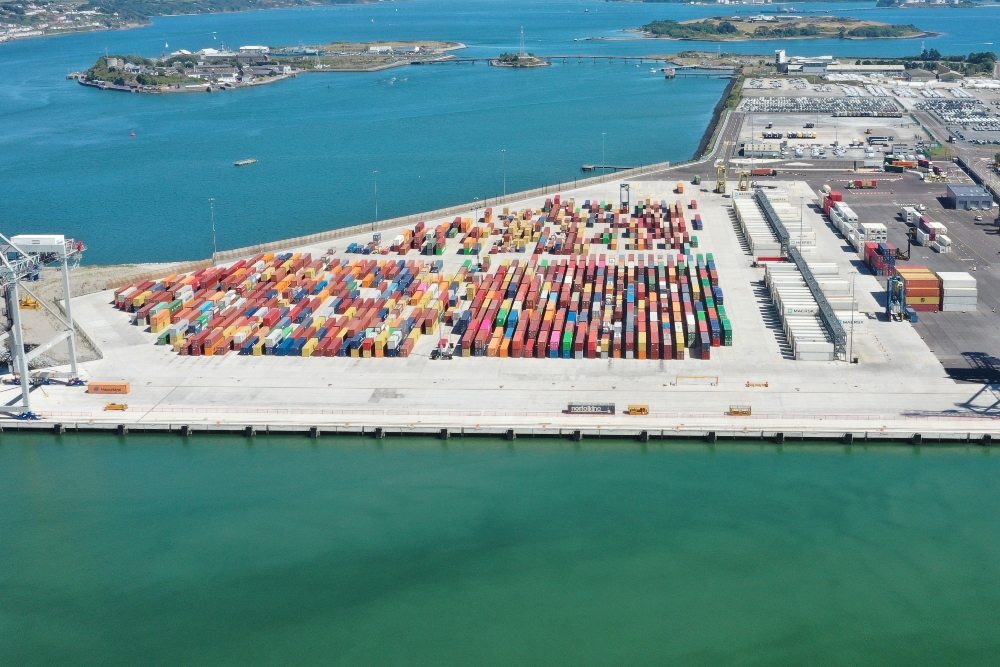A trade deal has been agreed between the EU and the US with 15% tariffs. But some sectors could be hit harder than others down the line. ThinkBusiness looks at the impact on Irish firms.
The newly signed EU-US trade framework agreement, announced on July 27, 2025, introduces a 15% baseline tariff on most EU goods entering the US, which is expected to have significant implications for Irish businesses.
It is hoped that the deal will prevent the escalation of tensions between the EU and the US, two trading blocks that between them account for almost one-third of global trade.
“The most exposed sectors will require support similar to the interventions provided as a response to Brexit”
While the baseline tariff of 15% averts the 30% rate threatened by the Trump administration, it will still have ramifications for export-focused businesses.
Of particular interest to Ireland is the impact on sectors like tech and pharmaceuticals, major foreign direct investment (FDI) employers in the country.
“We have stabilised on a single 15% tariff rate for the vast majority of EU exports,” said European Commission President Ursula von der Leyen. “This rate applies across most sectors, including cars, semiconductors, pharmaceuticals. This 15% is a clear ceiling. So no stacking. All inclusive.”
Taoiseach Micheál Martin, TD, said the trade agreement reached between the EU and the US will “help protect many jobs in Ireland.”
Likely impacts on Irish businesses
- Increased Costs for Exporters – Irish exporters to the US – especially in sectors like pharmaceuticals, semiconductors, and food and drink – will face higher costs due to the new 15% tariff. This is a sharp increase from the effective 1% rate that existed before April 2025.
- Pressure on Margins – Many Irish firms operate on tight margins, and the added tariff burden could make their products less competitive in the US market. Ibec, Ireland’s leading business lobby, has warned that an additional 5% tariff on top of existing ones could be particularly damaging for sectors already under strain.
- Call for Government Support – Ibec and Chambers Ireland are urging the Irish Government to introduce Brexit-style support measures to help businesses adapt. These could include financial aid, export diversification programs, and tax reliefs.
- Pharmaceuticals and semiconductors at Risk – These two sectors account for 75% of Ireland-US trade, and while they are included in the 15% tariff deal, there is uncertainty due to ongoing US Section 232 investigations into national security implications of such imports.
- Certainty vs. Competitiveness – While the deal brings predictability and avoids a full-blown trade war, Irish leaders like Taoiseach Micheál Martin and Tánaiste Simon Harris have acknowledged that the certainty comes at a cost. They emphasised the importance of having a stable framework, even if it’s less favourable than previous arrangements
- Potential for Future Adjustments – The agreement is a framework, meaning many details are still to be negotiated. This leaves room for sector-specific exemptions or adjustments, but also creates ongoing uncertainty
The sectors that will feel it most
Ireland is considered the most vulnerable EU economy in this trade shift due to its outsized dependence on US exports (26.6% of total goods exports go to the US) and its heavy reliance on US foreign direct investment, especially in pharma and tech.
The sectors in Ireland most affected by the new EU-US trade framework agreement and its 15% baseline tariff include:
- Pharmaceuticals
- Ireland’s largest export sector to the US, valued at €44 billion in 2024.
- Previously tariff-free, now facing up to 15% tariffs following a US national security investigation.
- This sector is particularly vulnerable due to its scale and reliance on US market access.
- Semiconductors and High-Tech Manufacturing
- Also under investigation by the US administration for national security concerns.
- Expected to face similar 15% tariffs, which could impact Ireland’s growing chip manufacturing base.
- Food, Drink, and Agriculture
- Especially Irish whiskey, which was hoping for a zero-tariff arrangement but remains in limbo.
- The sector has already seen closures and is bracing for further disruption.
- Medtech
- While not as prominently discussed, medtech is part of Ireland’s export-heavy life sciences sector and is at risk from both tariff and non-tariff barriers.
- Aircraft Leasing
- Exempt from tariffs under the new deal, which is a relief for Ireland’s globally dominant aircraft leasing industry.
- Technology and Internet Services
- While not directly hit by tariffs, many US tech firms with Irish bases (e.g., Google, Meta, Apple) could be affected by broader trade tensions and regulatory uncertainty.
Business leaders react
The CEO of business group Ibec Danny McCoy said the deal portends stability but also risk.
“Today’s trade agreement between the US and EU brings an end to a significant amount of uncertainty for some businesses,” McCoy said.
“However, a 15% tariff still represents a substantial burden for many industries. Sectors which rely heavily on the US market and operate within small margins, will once again be significantly impacted by an additional 5% tariff, on top of what they have already had to absorb over the past several months and well in excess of the 1% effective tariff which existing before April.
“Our message to the Government, as it was with the 10% tariff, is that the most exposed sectors will require support similar to the interventions provided as a response to Brexit.
“It is important to note that the details are still emerging and will only be worked out as today’s framework is fleshed out. These details will be critically important for Ireland. Pharmaceuticals and Semiconductors which equate to 75% of Ireland-US trade are, we understand, included in the 15% deal. However, there is still a question around the stability of that rate over both the short and long-term in the face of ongoing Section 232 investigations,” said McCoy.
The CEO of Chambers Ireland Ian Talbot said most businesses will welcome the certainty that a deal promises. “Certainty is critical for businesses and we’ve seen the impact of uncertainty over the past couple of months in terms of investment. While tariffs are never welcome news for businesses on either side of the Atlantic, reaching an agreement – however imperfect – is preferable to no deal. It at least allows companies to plan and adapt in the short term.
“Any clarity that can be provided – even if preliminary – lays the foundation for further negotiation and incremental progress on the tariffs that now exist.
“Efforts should be made to help businesses to adapt. The EU and Irish Government should work to create a fund to support viable businesses adapt to new tariffs and also to ensure potential arbitrage issues with Northern Ireland are clearly understood and addressed.”
-
Bank of Ireland is welcoming new customers every day – funding investments, working capital and expansions across multiple sectors. To learn more, click here
-
For support in challenging times, click here
-
Listen to the ThinkBusiness Podcast for business insights and inspiration. All episodes are here. You can also listen to the Podcast on:
-
Spotify
-
SoundCloud
-
Apple





